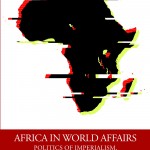Rajen Harshe’s book rightly questions Western scholarship’s tendency to universalise its interpretations of the world, particularly of Africa – and goes on to craft a non-Western viewpoint for this enterprise. The author argues that contemporary Africa needs to be studied against the continuum of its colonial, anti-colonial, and post-colonial experience, which includes the impact of imperialism and the powerful forces of globalisation and market capitalism.
The origins of colonialism are traced to ‘the white man’s burden’, the belief in the superiority of Western nations and their self-appointed obligation to spread the fruits of an advanced civilisation. For centuries, this argument was used to mask the subjugation of Africa, which led to the emergence of works by African thinkers, such as Kwame Nkrumah, Julius Nyerere, Frantz Fanon and Amilcar Cabral.
Africa’s struggle to win intellectual liberation is as important as its success in securing political freedom: a whole chapter is devoted to the liberation struggle in South Africa and the work of Nelson Mandela, a subject on which the author is considered an authority. Pan-Africanism and African unity movements are given a separate chapter.
The author, in his comparative analysis of British, French, and Portuguese colonial styles, shows Britain safeguarding its democratic credentials, but not hesitating to be exploiter too, though far gentler than the others. The Portuguese and Belgians were seriously vicious, trying, until the end, to make the subjugated people suffer. When freedom came, the colonised were hardly able to govern themselves.
The paradoxical impulses of the French, particularly the constant battle between their republican and authoritarian tendencies, was reflected in their handling of Francophone Africa, both during the colonial and post-colonial periods. Of all colonial nations, France proved the most successful in retaining and consolidating her neo-colonial ties with the former colonies, especially in the cultural, economic and defence domains. A chapter is devoted to what Harshe, who was partially educated in Paris, terms as “the Franco-African ensemble”.
The book presents an insightful analysis of the changing complexities of the U.S.’ imperial policies in Africa. The U.S. showed a glaring gap between its image as a citadel of democracy and champion of human rights, on the one hand, and a ruthless superpower that blindly supported its Western allies and former colonial powers, on the other. Starting from the 1960s, its role became more pronounced and proactive, driven by Cold War rivalry with the Soviet Union; the quest for Africa’s oil and minerals; and the need to preserve influence in strategic regions, such as the Horn of Africa and southern Africa. After the Cold War, the U.S. became increasingly more occupied with security issues. In South Africa, Washington supported the apartheid regime, choosing to side with the liberation camp only when racism began to hurt its capitalist interests. Perhaps the U.S.’ role may have become clearer if the author had added a separate chapter on the engagement of the Soviet Union/ Russia in Africa.
Harshe does dissect China’s expanding profile in the continent, raising the fundamental question about whether its impulse is “altruistic, neo-imperialist or just a partnership in the development process”. Referring to the different trajectories of China’s role in the past seven decades, he argues that dubbing China as a neo-colonial power may “sound reductionist”. Yet, he concedes that its overall dominance in economic, political, strategic, and other domains is “a reality”, and that it “does display clear imperialist tendencies” in Africa. Nevertheless, he qualifies it by pointing to the growing acceptability of Chinese economic assistance and investment by African nations, which thus have “a fresh option” to prosper. In short, ‘China-in-Africa’ is a complex, evolving equation with unseen long-term implications.
On India-Africa relations, the author notes with satisfaction that India has demonstrated a capacity to redesign its bilateral and multilateral ties in the realm of security, the economy, and development cooperation. He should have added political relations to this list. In his view, “Such ties can be better cemented if India continuously remains sensitive to the changing social realities in Africa” and adapts its policy to Africa’s circumstances “without losing sight of (its own) requirements as a rising power in world politics”.
The author frames his theoretical and empirical formulations, using a battery of questions at the beginning of the chapters and ending with a set of conclusions. In the process, some repetition does occur. He begins the book by referring to Africa as “the continent of the future” and ends it by asking if Africa will become “a major player in international politics”.
This important study will serve those looking to better understand issues pertaining to the Africa of today. It is like a tour d’horizon: part political history and partly a history of ideas, and coming from a writer from the Global South, it merits attention.
Africa In World Affairs: Politics of Imperialism, The Cold War And Globalisation by Harshe Rajen (Routledge 2019)
Rajiv Bhatia is Distinguished Fellow, Foreign Policy Studies Programme, Gateway House and a former High Commissioner to South Africa, Kenya, and Lesotho. He comments regularly on developments in Africa and India-Africa relations.
This review was exclusively written for Gateway House: Indian Council on Global Relations. You can read more exclusive content here.
For interview requests with the author, or for permission to republish, please contact outreach@gatewayhouse.in.
© Copyright 2019 Gateway House: Indian Council on Global Relations. All rights reserved. Any unauthorized copying or reproduction is strictly prohibited.


